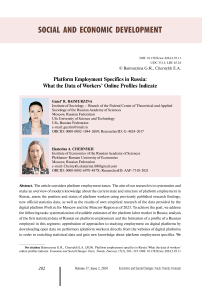Platform employment specifics in Russia: what the data of workers’ online profiles indicate
Автор: Baimurzina G.R., Chernykh E.A.
Журнал: Economic and Social Changes: Facts, Trends, Forecast @volnc-esc-en
Рубрика: Social and economic development
Статья в выпуске: 2 т.17, 2024 года.
Бесплатный доступ
The article discusses platform employment issues and aims to systematize and provide an overview of current knowledge about the state and structure of platform employment in Russia. It also aims to assess the position and status of platform workers based on previously published research, new official statistical data, and the results of our own empirical research using data from the digital platform Profi.ru for Moscow and the Moscow region as of 2023. To achieve this goal, the following tasks were addressed: systematizing available estimates of the platform labor market in Russia, analyzing the primary statistical data from Rosstat on platform employment, and creating a profile of a typical Russian employed person in this segment. Approaches to studying employment on digital platforms were also tested by downloading open data on platform workers directly from the platforms' websites in order to enrich statistical data and gain a better understanding of platform employment specifics. We conclude that the platform employment structure is institutionalized within social practices and is gradually approaching the general employment structure in terms of basic socio-demographic characteristics. However, it still has its own unique features. For example, the average age of platform workers is lower than that of the overall employed population. Platform workers are predominantly male and urban residents. At the same time, platforms, particularly those providing physical services on a local level, are characterized by a predominance of traditionally vulnerable groups in the labor market, such as women aged 20-29 and 3039 with young children, students, and young people without work experience. Migrants and individuals without professional qualifications are also overrepresented among platform workers. Data from the Profi. ru website indicates that these workers are mainly employed in the informal economy. More than 10% of the profiles on the platform in question are "false", that is, they belong to organizations, teams, or groups of performers (formal or informal) rather than individuals.
Digital labor platforms, platform employment, platform worker, portrait of a platform worker, platform employment risks
Короткий адрес: https://sciup.org/147243854
IDR: 147243854 | УДК: 331.5 | DOI: 10.15838/esc.2024.2.92.11
Текст научной статьи Platform employment specifics in Russia: what the data of workers’ online profiles indicate
Platform employment in Russia emerged as a result of the rapid development of the digital economy and technology, as well as changes in consumption and production patterns (Abdrakhmanova et al., 2023). It has become popular due to the fact that it provides flexible employment opportunities and access to additional earnings (Brancati et al., 2019). In addition, platforms effectively synchronize the demand and supply of services, which is attractive to businesses and consumers (De Stefano et al., 2021; Berg et al., 2018). At the same time, platform work is changing the perception of the role of labor (turning labor into a commodity) (Aloisi et al., 2023; Kullman, 2021) and has several features related to algorithmic control (Piasna, 2023).
The history of the development of digital labor and platform employment in Russia is believed to begin in the mid-2000s, when platforms related to freelancing appeared on the Russian market1.
Due to digitalization in Russia, the platform employment development in terms of information technology and the platforms themselves is one of the most successful examples in the world: the contribution of digital platforms to the country’s GDP ranges from 2 to 5%2. Russia is considered to be one of the most advanced countries in regulating remote employment (provisions for which were introduced into the Russian Labor Code back in
2013). However, labor and social security guarantees and standards, liability of the parties for failure to fulfill contractual obligations, etc., as well as tax control are still more often left out of regulation (Bobkov, Chernykh, 2020; Chernykh, 2020; Aloisi, 2022).
It is important to know the scale and key features of the development of the new segment of the labor market for effective regulation of platform employment. Significant steps have been made in this direction. Special questions have been introduced in the Rosstat sample labor force survey program since 2022, which make it possible to assess the approximate scale and structure of those employed in the platform economy by gender, type of settlement, level of education, and nature of employment (main or additional). At the same time, many parameters of employment quality (income level, labor safety, social security, job satisfaction, etc.), data on the share of migrants among platform workers, employment status (dependent/independent; formal/informal) are still not covered by statistics.
Discussions on the legalizing role of labor platforms and the relationship between formal and informal employment of platform workers remain relevant (Daugareilh et al., 2019).
Academic studies and projects by international organizations3 (see, for example, Sinyavskaya et al., 2021; De Stefano et al., 2021; Berg et al., 2018; Hauben et al., 2020; Abraham et al., 2019; Daugareilh et al, 2019) note that digital work platforms (DWPs) may expand precarization because work on them is characterized by the absence of labor standards and social protection mechanisms and takes place outside the formal legal framework (in the work (Aloisi et al., 2023), this property of platforms is referred to as the “pandemic of precariousness”). There is an alternative view (Strebkov, Shevchuk, 2022; Shevchuk, 2023; Piasna et al., 2022; Weber et al., 2021) that DWP contribute to the reduction of informal employment by offering procedures, standards and rules through algorithmic control and management. It is worth noting that formalizing employment relations through DWP does not necessarily mean withdrawing workers from the shadow sector and including them in statistical reporting and taxation (“platforming informality”)4.
Assessment of the scale of platform employment in Russia is difficult due to a number of reasons: there are no complete and reliable official statistical data, platform workers may have different employment status. Information on the volume, structure and main qualitative characteristics of platform employment can be obtained indirectly, for example, by conducting sample surveys or polls, as well as by assessing particular components of the platform workers’ category. Household surveys, administrative data or big data can serve as a complement, with each source having its own strengths and weaknesses. The choice of method for estimating the volume and dimensions of platform employment depends on research objectives and available resources of statistical agencies or researchers5.
The structure remains unclear and the variety of forms and types of platform employment is not described, despite the existence of a number of works devoted to the classification and typolo- gization of this type of employment (for instance, Howcroft, Bergvall-Kareborn, 2019). There is no single definition of platform employment in the literature. According to the OECD, platform workers are defined as those employed who use an app or website to find customers, wanting to provide a service (rather than goods) for money6. At the same time, it is known that the key categories of workers on platforms are self-employed, private entrepreneurs, individuals performing work on the basis of civil law contracts, employees for whom platform employment is not the main employment, as well as people who are not classified as employed by official statistics (Chernykh, 2021). According to Strategy Partners research (online survey), 89% of self-employed respondents said that their work is based to some extent on the use of online services and platforms7. The number of self-employed (which is a category that overlaps with, but is not numerically equal to, platform workers) exceeded 9 million in 2023, with 7,500 people becoming selfemployed every day8. Experts caution that these data cannot be the basis for estimating the size of the platform economy in Russia, as only a small number of platform workers are registered as self-employed or private entrepreneurs. Many self-employed people work with the help of their established customer base or seek new ones through personal connections (Sinyavskaya et al., 2021; Sinyavskaya et al., 2022).
The aim of our research is to systematize and characterize the current knowledge about the state and structure of platform employment in Russia, to assess the position and status of platform employment on the basis of previously published works, new data from official statistics, as well as the results of an empirical study of data from the digital platform Profi.ru. We consistently solve the following tasks to achieve the aim:
to systematize available estimates of the platform labor market in Russia;
to analyze Rosstat’s first statistical data on platform employment and forming a profile of a Russian employed in this segment;
to approve approaches to studying employment on digital platforms by parsing (downloading) open data on performers (platform workers) directly from the sites of digital platforms, to enrich statistical data and obtain new knowledge about the features of platform employment.
The practical and theoretical value of our work lies in the fact that it contributes to the confirmation of existing hypotheses and the formation of new ideas about platform employment. The scientific novelty of the study consists in the use of big data (information from Profi.ru digital platform workers’ profiles) and comparing them with the data of official statistics and other surveys, as well as in the application of our methodology for recovering data on the age and education level of workers. We expand the understanding of platform workers as a result of the structuring of data on Profi.ru platform workers by service areas, types of employment (online and offline; requiring or not requiring high qualifications).
Research methodology
The paper systematizes and compares secondary data previously obtained by other researchers with the new Labor Force Survey (LFS) data obtained by Rosstat as a result of the introduction of questions on platform employment in 2022. Despite the high level of reliability of the LFS results, we should note that the obtained scale of platform employment is still difficult to assess as accurate due to the volatility of quarterly data (for example, aggregated data on the education level of platform workers differ significantly by quarter). At the same time, these data served as a reference point and a basis for interpreting the results of the pilot empirical study based on the collection and analysis of open data from an Internet source using methods applied to big data: downloading, parsing, extraction and structuring, textual analysis, formation of a dataset for analysis using sociological methods.
The basis for the empirical study is data from the Profi.ru platform, a service for searching for specialists. The Profi.ru digital platform is one of the most popular, widespread throughout Russia, covering a variety of activities and services: those requiring and those not requiring high qualifications and the physical presence of the performer in a particular place.
We analyzed random 1,000 profiles from about 460 thousand downloaded html-pages with characteristics of specialists working in Moscow and the Moscow Region (we considered it as one region). These territories account for almost half of all registered performers on the platform. As of January 2024, the regions (sections) with the largest number of performers also included Saint Petersburg (128.8 thousand), Krasnodar and the Krasnodar Territory (30.8 thousand); Yekaterinburg and the Sverdlovsk Region (24.6 thousand); Novosibirsk and the Novosibirsk Region (20.6 thousand); Kazan and the Republic of Tatarstan (18.7 thousand); Rostov on Done and the Rostov Region (15.8 thousand); Nizhny Novgorod and the Nizhny Novgorod Region (14.6 thousand); Samara and the Samara Region (11.1 thousand); Krasnoyarsk and the Krasnoyarsk Territory (10.7 thousand); Voronezh and the Voronezh Region (10.4 thousand); Chelyabinsk and the Chelyabinsk Region (10.3 thousand); Ufa and the Republic of Bashkortostan (10.1 thousand). Each of the other regions has less than 10,000 registered performers.
The data was collected during 2023 by downloading data from the profiles of performers registered on the platform. First, the sitemap.xml of a certain section of the site was downloaded (formed by region), in our case – for Moscow and the Moscow Region. A list of links to profiles is formed from the sitemap, and then the process of downloading profiles from the list is started.
Data were extracted from the received html files and converted into linked tables in csv format using a specially written program in Python programming language. The tables contain the following structured data about the performer: unique identifier of the performer, gender, region of work performance, types of services, cost per unit of services, information about education, work experience, achievements, rating, feedback on the performer (not more than 10 pieces – site limitation), business card (text about yourself), date of last presence on the site and other characteristics that are available in the downloaded html-page. As a result of multi-stage processing of random 1,000 profiles and preparation of data for analysis, 902 performers remained in the sample. Profiles pertaining to an organization rather than an individual performer; those with very little data were excluded from analysis.
Platform employment in Russia: estimates by researchers and Rosstat
According to Rosstat estimates, 3.502 million people will work on platforms in 2022 and 3.415 million in 2023, i.e. approximately 4.6% of the total number of working citizens. In different quarters of 2022–2023, the share of platform employment in total employment ranged between 4.5–7%. For 95–96% of platform employment is the main job9.
Based on earlier calculations, the number of platform workers in Russia ranges from 7 to 10
million people (Sinyavskaya et al., 2022) and even reaches 15.5 million people, 3.5 million of whom earn income through digital labor platforms on a regular basis, and for 1.7 million the income from this activity is the main10.
The Institute for Social Policy estimates (a sample of 12,000 people aged 18–72, based on VCIOM’s probability online panel by selfcompletion) that 14.7% of Russians aged 18–72 have experience of platform employment in April 2022, including 11.6% in the format of occasional part-time work, 1.6% in the format of regular parttime work in addition to their main job, and 1.6% were employed on DWP as their main job. Among the employed, the share of those who indicate employment on platforms as their main job is 2.4% (Sinyavskaya et al., 2022).
According to a study by the Center for Strategic Developments 2022 (based on a quota sample), 62% of Russian platform workers are men, for whom platforms are the main source of income. As in other countries, platform employment in Russia is more popular among young people: the average age of platform workers is 31. For more than 85% of platform workers, platform work is the main source of income, and almost 70% of workers receive tips. In addition, Russia has a relatively high share of foreign platform workers (32%)11.
Freelancers are a separate category of platform workers (but also not identical to them). Freelancers are engaged in skilled labor and perform tasks remotely, using online platforms (in ILO terminology, these are crowdwork platforms – platforms of mass work on which many performers can perform tasks for large organizations and private customers12. The largest platforms for freelancers in Russia are considered to be FL.ru (more than 6.3 million users (Strebkov, Shevchuk, 2022)), Kwork. ru, Freelance.ru, Advego.com (3 million users) and Etxt.ru (about 1.5 million users), bringing together more than 14 million accounts in total. However, it is important to realize that the number of accounts does not mean the number of service providers. For a very rough estimate, this figure can be divided in half, as there can be both customers and performers (platform workers) among them.
There are platforms for finding specialists in various fields (not only for freelancers), including YouDo (3.5 million performers13), Profi.ru (2.6 million performers14), a special section of Avito (2.8 million performers) and other smaller platforms, which together employ about 9 million people. And taking into account courier services, food delivery and transportation (cabs) working with the help of aggregators, the total number of people employed through platforms may exceed 16 million. However, if we take into account that platform workers can be simultaneously registered on several platforms, we tend to believe that 15–16 million people is the upper limit of the approximate scale of platform employment in Russia. The lower limit is 3.5 million (according to Rosstat).
The research (Chernykh, 2021) notes that Russian platform workers are younger and more educated compared to average wage earners, and platforms have a gender shift toward men. However, the current dissertation study by A.V. Shevchuk makes the following conclusion: due to the fact
Figure 1. Structure of platform employment and employment as a whole at the main job by age group and gender, %
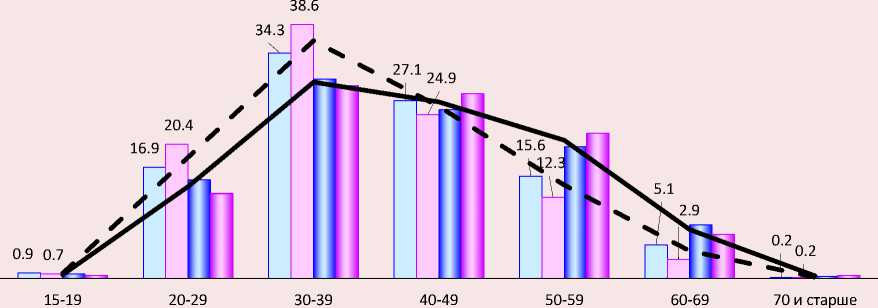
Male_plat I I Female_plat L J Male_gen
Female_gen Total_plat ^^^^^^ж Total_gen
Source: own compilation based on data from the Population Survey on Employment Problems, Rosstat, 2023.
that platform employment is spreading more widely, the socio-demographic characteristics of platform workers are becoming less specific, and the gender bias is gradually leveling off. At the same time, the employment forms and labor strategies chosen by platform workers are linked to the so-called “value profiles” of the workers15. In other words, platform workers seek to find a job that is consistent with their perceptions of their values and desired lifestyle.
We made calculations based on Rosstat data for 2022–2023 to build a profile of a modern Russian platform worker.
The available data show that the structure of platform employment is indeed slightly skewed toward younger ages (Fig. 1). We should note that among platform workers in the age groups 20– 29 and 30–39, the share of women is higher than that of men. One of the explanations for this fact may be that women at the age of 30–39 are on maternity leave or are actively involved in the upbringing of minor children, and platform work (if it is carried out remotely) allows combining this with employment in the presence of high selforganization and necessary home conditions. The share of platform workers in the middle age group (40–49 years old) is about the same as in the whole sample of employed people, while it is smaller in older age groups. The latter suggests that at older ages, workers favor traditional employment forms and/or lack the necessary (digital) skills for platform work. Thus, the earlier conclusions (Chernykh, 2021) that the average age of a platform worker is lower than that of an average employed person are confirmed.
Rosstat data do not contradict other studies. In particular, in (Sinyavskaya et al., 2022), youth participation in platform employment on an episodic basis, as a part-time job, is estimated at 27.2% among 18–24 years old and 25.7% among 25–34 years old; on a regular basis, including as a main job, at 9.1 and 12.3%, respectively. The 25–
34 year old group makes the largest contribution to both occasional and regular employment in DWP.
The calculations prove ( Fig. 2 ) that among platform workers in general men predominate (53– 57%). Platform workers are also more often represented among city residents (82–86%).
At first sight, the structure of platform employment by education level does not differ much from the overall employment structure. Both segments have almost identical shares and gender ratios of workers with higher education; women have a higher share of holders of higher education than men ( Fig. 3 ).
Figure 2. Structure of platform employment and employment as a whole in the main job by gender and place of residence, %
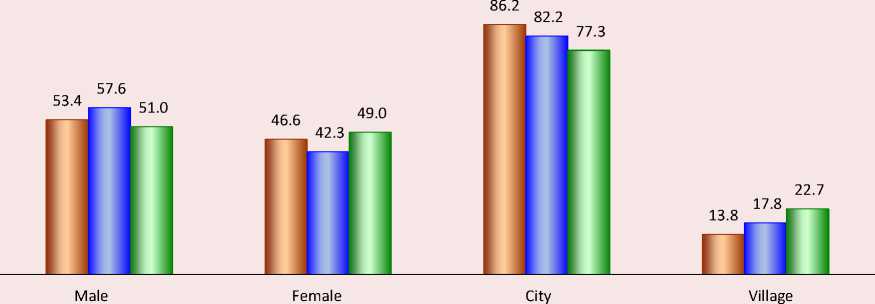
□ platform employment 2022 □ platform employment 2023 □ employment in general 2023
Source: own compilation based on data from the Labor Force Survey, Rosstat, 2022, 2023.
Figure 3. Structure of platform employment and employment as a whole by gender and education level, 2023, %
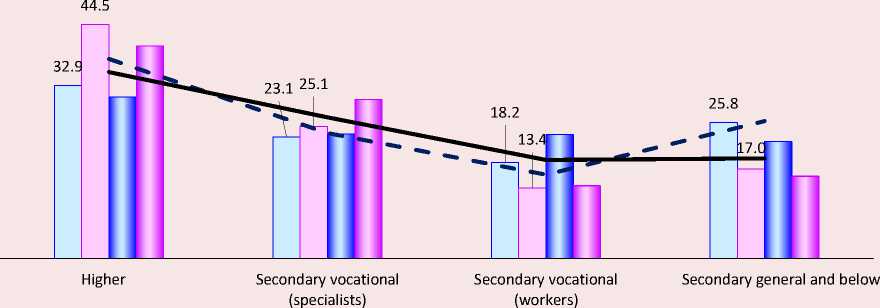
1=1 Male platf I I Female platf Male
I ■ Female Total platf ^^^^^^^v Total
Source: own compilation based on data from the Labor Force Survey, Rosstat, 2023.
However, the platform segment has a noticeably higher share of persons with no professional education – 26.1% in 2023, while in the total employment structure their share was 19.0%. In our opinion, this is due to the fact that platforms provide ample employment opportunities (often informal) for people without professional education as couriers, cab drivers, domestic staff, handypersons, etc. Statistics, thus, objectively reflects the existence of segmented labor markets of specialists and executors of orders depending on the skill level.
In general, the structure of platform employment does resemble the general structure of employment and perhaps aspires to it, but still has its own features. The dynamics of changes in this structure is an interesting object for further analysis.
A separate issue for further study is platform employment of labor migrants in Russia. This category requires additional research, but the leading motive for choosing employment for these workers is obviously the opportunity to earn income.
After the coronavirus pandemic, the delivery sector (courier work), which previously employed mostly migrants, began to actively “pull” labor resources (also predominantly represented by migrants) from the housing and utilities sector16.
Employment platform Profi.ru is one of the popular sites for remote workers (freelancers) and offline self-employed people looking for work via the Internet, its history dates back to 2005 (the site started as a service “Your Tutor”). Currently, the platform helps to quickly connect supply and demand for a variety of services throughout Russia, as well as Kazakhstan and Belarus. Job seekers register for free on the site, fill out special forms, choose the categories of services they can offer, and pay a small commission in case of a successful transaction. In total, 2.6 million performers are registered on the site, as of March 1, 2024.
|
Category |
Types of services |
|
Repair |
Minor repairs, plumbing, heating, electrical work, drywall, complex repair, ceilings, floors, construction, interior design, planning and design, estimation work, engineers, drafting, furniture assembly, furniture manufacturing, painting and plastering, painting walls, wallpapering, application of liquid wallpaper, windows, tilers, doors, installation/dismantling of air conditioners, high-rise works. |
|
Artists |
Singers, presenters, event management, catering, shows, live statues, children’s shows, theater performances, painting, artists, embroidery and decorating, art painting, handicraft training, music, musical groups, DJs, instrumentalists, florists, event decor, hall decoration, photo zone, wedding bouquets, artists, portraitists, landscapers |
|
Beauty |
Massage, cosmetology, eyelash extensions, hair extensions, lamination, manicure, pedicure, makeup, tattooing, facial cleansing, piercing, tattoos, styling, haircuts, coloring, hair removal |
|
Household staff |
Housekeepers, drivers, cleaning, dog walking, cooking, sober driver |
|
Photography, videography |
Photographer, exit photo shoot, children’s, wedding, romantic, corporate photography, photo processing, portfolio, videographers, photo processing, video editing, inscriptions on the photo, video training, portrait photography, photo shoot in the studio |
End of Table 1
According to the data of our uploaded dataset from Profi.ru for Moscow and the Moscow Region (902 people), the longest work experience on this platform is observed among tutors, show business representatives and photographers, the shortest – among IT freelancers, accountants and lawyers (Tab. 2). In the sample as a whole, the average period of work on the platform is 3.9 years, i.e. almost 4 years. One fifth of the performers’ profiles were registered on the site more than 5 years ago. It is worth noting that there are no such profiles at all in the categories of performers “other” and “driving instructors”. People consider these types of work rather as temporary part-time jobs or leave the site after gaining their client base.
Modern methods of big data analysis and machine learning make it possible to study a large number of text documents (including websites, forums) using statistical and graphical methods; to assess the popularity (or acuteness) of phenomena or concepts in the media, scientific literature and social networks; to identify attitudes toward them through the assessment of the tone of texts; to identify the main themes, norms and values associated with the phenomena under consideration. Figure 4 shows a “word cloud” of all types of services provided on the Profi.ru platform by a random sample of
|
Category |
Total in the sample, people |
Share in the sample, % |
Female share, % |
Average duration of work on the platform, years |
Share of employees working for more than 5 years, % |
|
Repair |
244 |
27.1 |
5.7 |
3.3 |
18.0 |
|
Tutors |
239 |
26.5 |
74.5 |
4.8 |
33.0 |
|
Beauty |
109 |
12.1 |
86.2 |
4.4 |
16.0 |
|
Household staff |
71 |
7.9 |
64.8 |
3 |
11.0 |
|
IT-freelancers |
60 |
6.7 |
38.3 |
2.5 |
8.0 |
|
Other |
42 |
4.7 |
21.4 |
3.4 |
0.0 |
|
Artists |
40 |
4.4 |
35.0 |
5.4 |
40.0 |
|
Sport |
34 |
3.8 |
50.0 |
4.2 |
30.0 |
|
Photography, videography |
28 |
3.1 |
42.8 |
4.7 |
29.0 |
|
Accountants, lawyers |
25 |
2.8 |
64.0 |
2.7 |
13.0 |
|
Pet services |
6 |
0.7 |
83.3 |
4 |
29.0 |
|
Driving instructors |
4 |
0.4 |
25.0 |
3 |
0.0 |
|
Total (average) |
902 |
100 |
47.6 |
3.89 |
21.20 |
|
Source: own research data. |

performers working in Moscow and the Moscow Region, built using the Python programming language17. “Word cloud” is an image composed on the basis of text. Different size and color depend on the frequency of occurrence of the word in the text. Thus, it is possible to evaluate the variety of services at a glance. It can be seen that the most frequently offered services are repair and related services, help in learning languages and in preparing for the Unified national exam, massage, design services, etc. These words are obviously grouping words for more specific types of services written in small letters.
In the course of the analysis, we identified several unusual services offered by platform workers, such as “interlocutor for an hour” and “pet cab”. An interesting trend is when one worker offers services in several spheres at once – for example, as a tutor, an au pair and an online promotion specialist (about 5–7%).
The gender composition of employees in our sample is balanced – 47.6% of all platform workers are women. However, in the context of occupational groups of occupations, there is gender inequality in a number of occupations and a clear division of employment spheres into “male” and “female”. For example, among tutors and beauty workers (manicure, hairdressing, cosmetology) women prevail (74.5 and 86.2% respectively). A similar gender shift in favor of women is observed in the sphere of household staff, mainly represented by cleaners, cooks and nannies. Among them, 64.8% are women. Men in this sphere mainly work as drivers or security guards. Women prevail among representatives of accounting and legal services (64%), as well as among those working with pets (83.3%).
The feature of collecting (extracting, filling in) data from the Profi.ru website is that the identification of some information about performers requires logical analysis of texts and special calculations, for example, about the level of education, age, price for certain types of services. For instance, in the absence of direct markers of age, we used algorithms to calculate the minimum age of the performer by identifying the year of the beginning of the career. For example, if information was available on the year of enrollment in a higher professional education institution, 4 years were added to it. Next, the minimum age of the performer was calculated based on the assumption of the average age of career start, which is 22 years. In the absence of data on education, data on the length of service on the platform could be used: assuming a possible start of a career on the platform at the age of 20 (after secondary vocational education or after the army), 20 years were subtracted from the current year, as well as the number of years of work on the platform, resulting in the minimum age of the performer. Thus, we obtained an approximate estimate of the average age of a platform worker on the Profi.ru service – 31 years ( Fig. 5 ). According to Rosstat, the approximate average age of platform workers in their main job is much higher – 39.5 years (men – 40.4 years, women – 38.2 years). It should be borne in mind that Rosstat takes
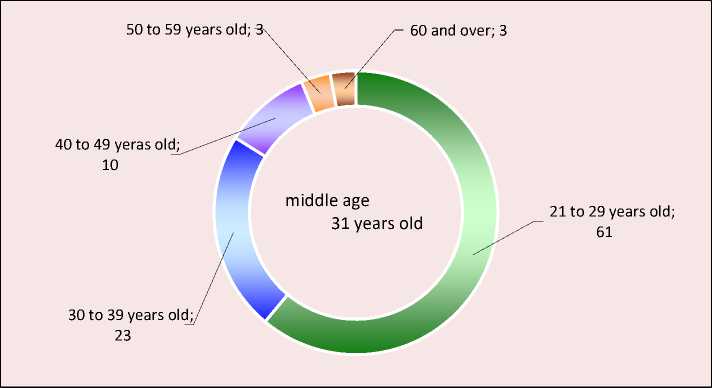
into account all types of employment through various platforms, including courier services and transportation (cabs). Profi.ru has no such services. The presence of younger respondents of performers on Profi.ru can also be explained by the demand for Unified national exam preparation services, which are often provided by students. The platform also provides opportunities for more or less permanent or one-time part-time work for the period of study, and for finding a permanent job.
The paper analyzed information about the performer, and achievements to obtain information on the level of education, various text fields describing education. However, only 351 people out of 902 performers (39%) could be identified as having a minimum education level. This is partly due to the fact that performers do not always consider it important to specify this information, especially if the work does not require confirmation of the skill level and it is sufficient to mention only existing certificates (housekeepers, drivers who help with animals, confectioners, some artists, fitness trainers, beauty industry workers).
When analyzing the level of education of platform workers ( Fig. 6 ), we identified the following problematic aspects. First, the absence of information about higher education in the profile does not always indicate its real absence. Sometimes workers cannot find employment in their specialty or receive low wages at their current place of work, get another specialty, often unrelated to their basic education, or engage in simpler but income-generating activities. In this case, we can talk about the mismatch of education with the requirements of vacancies, which is one of the reasons for the shortage of personnel in the modern labor market. In addition, it can be assumed that some workers have excessive level of education when they perform work requiring less qualification than they have.
Second, the modern market actively offers short-term (from a few weeks to a few months) courses in a variety of areas (eyelash extension, manicure, programming and many others), after which people are given certificates, promises quick employment with high wages.
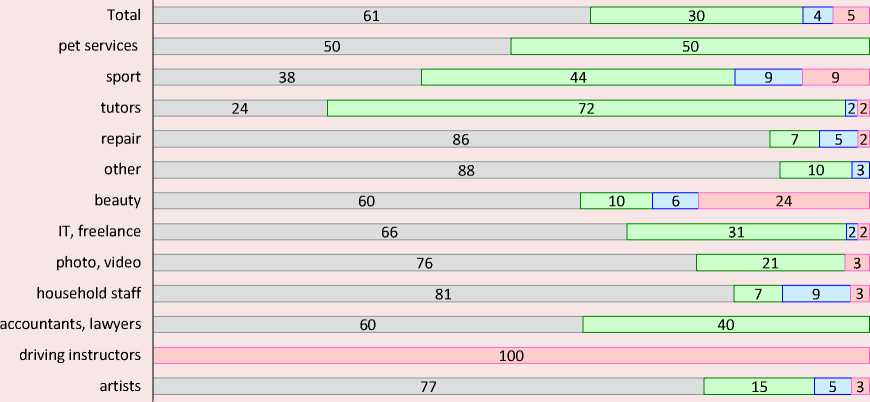
□ no data, % □ higher, % □ second. vocat., % □ course, %
Unfortunately, the uploaded data do not allow reliably judging the level of education of platform workers on the portal we are interested in. However, we can note that the presence of higher education as a competitive advantage is important primarily for tutors, in other areas its value is less or other markers of skill (signals on the labor market) work – a portfolio of work, achievements, work experience or customer feedback. Quite a high share of those who directly or indirectly indicated their level of education is noted among lawyers and accountants (40%), in sports (44%), among those offering services for pets (50%, it is important to note that there are 6 people in this category in total), representatives of IT and freelancers (31%), as well as those earning money from photography and videography (21%). In the beauty industry the most popular marker of professionalism is certificates, higher education was indicated by only
10%, secondary professional education – 6% of performers. None of the four driving instructors indicated the level of education, but it is obvious that all of them have taken driving courses, so we marked them as having specialized training.
During the analysis of advertisements about services posted on the Profi.ru website, we found no phenomena confirming the thesis about the legalization of platform employment. In the random sample considered, we met information that the service is provided by a private entrepreneur only once, and once – that the work is provided under a contract. We can state that employment provided through the Profi.ru platform is almost entirely related to the informal economy. Some profiles are seen to be registered not to specific performers (although this is prohibited by the platform’s policy), but to intermediaries or representatives of organizations engaged in providing the necessary specialists. But even in this case, there are no signs that the performers are registered self-employed, private entrepreneurs or work under a civil law contract.
Conclusion
The study proves that platform employment as a socio-economic phenomenon is gradually expanding and institutionalizing, formalizing into widespread social practices, but is still far from legalization. Platform employment can be both formal and informal, performed within the framework of labor relations or on the basis of independent partnership. However, the feature of this employment form is that it develops primarily in the sphere of services: physical (massage, cleaning, manicure, etc.) or cognitive-emotional, associated with the provision of advice, lessons, creativity, production of intangible values.
It is positive that platform employment is reflected in state statistical surveys. At the same time, it is obvious that the data of researchers and Rosstat regarding its scale do not agree yet. This indicates the need for its further study, identification of its structural elements, clarification of the terms and criteria used.
At present, the socio-demographic structure of platform employment is converging with the structure of general employment, but still has its own features. There are still more young platform workers: a rough estimate of the average age of a platform worker on the Profi.ru service is 31 years; according to Rosstat data for 2023, the average age of platform workers in their main job is noticeably higher – 39.4 years (men – 40.2 years, women – 38.4 years). Among platform workers, on average, the predominance of men remains, but in the age groups 20–29 and 30–39, the share of women is higher than men. Platform workers are more often residents of cities. The platform segment has a noticeably higher share of persons without professional education – 26.1% in 2023, while in the total employment structure their share was 19.0%. In our opinion, this is due to the fact that platforms provide ample employment opportunities (often informal) for persons without professional education as couriers, cab drivers, household staff, handymen, etc., as well as to the fact that they are more likely to be employed in urban areas.
The results of the previous studies, as well as our empirical analysis, indicate that there is a large share of migrants (workers with citizenship of another country, mainly the CIS) among low-skilled workers in DWPs. Russian legislation imposes different requirements for the procedure of labor activity for citizens of different CIS countries, and for many of them working through the platform is the only possible way of employment.
The empirical study revealed the following trend. A significant part (at least 10%) of personal registered accounts hide either small companies, or collectives (groups) of employees, or individual entrepreneurs with hired employees, or simply intermediaries redistributing orders between employees. The analysis showed that some profiles are disguised as personal, although in reality they are not. Some of them are openly positioned as team/company profiles, but are labeled as personal profiles. In a large number of cases, accounts are duplicated: some employees have both personal profiles and are listed in “teams” with intermediaries, often with several of them. At the same time, we can see the opposite trend: several specialists work under one account. Thus, it is difficult to determine the volume of the real offer of services. Often, if a master themselves cannot take an order at the moment, they offer to give the contact of their colleague. This indicates the presence of a developed informal community of masters in certain areas. This situation is typical for show business services, various repair services, and cab services. To solve the issue of “false” personal profiles that actually belong to companies or collectives, it is necessary to make changes to the rules of posting information on the platform, to conduct a more thorough check of profiles. In case an employee presents his/her passport (there is a box in the profile whether the passport of the performer is checked or not), it is necessary to check that the services are provided by the person who is registered on the platform.
In early 2023, a bill was introduced in the State Duma to amend the law “On Employment in the Russian Federation” to include platform employment in the legal field. In March 2023, this bill 275599-8 was passed in the first reading, it was assumed that the very principles of regulation of platform employment will be specified in the “satellite laws”18. Lawmakers proposed to introduce quite tangible control over platforms and their employees: to oblige companies to register in special registers, to keep a rating of platform employment, to inform performers about all the terms of the order, etc. The main issue of the draft law on platform employment is how to distinguish between partnership/market relations and labor relations and who should be given immunity from reclassification of these relations as labor relations19. There is a discussion among experts as to which platforms should be subject to special regulation. It is believed that these should be technologically mature platforms, but the criteria for this category have not yet been developed. It was assumed that “platform” employees would be subject to mandatory norms of work and rest, payment, access to social guarantees and pensions, but by the second reading of the bill, the provisions on the regulation of platform employment were excluded20.
Список литературы Platform employment specifics in Russia: what the data of workers’ online profiles indicate
- Abdrakhmanova G.I., Gokhberg L.M., Dem’yanova A.V. et al. (2023). Platformennaya ekonomika v Rossii: potentsial razvitiya: analiticheskii doklad [Platform Economy in Russia: Development Potential: Analytical Report]. Moscow: ISIEZ VShE. DOI: https://doi.org/10.17323/978-5-7598-3001-6
- Abraham K.G., Haltiwanger J., Sandusky К., Spletzer J. (2019). The rise of the gig economy: Fact or fiction? AEA Papers and Proceedings, 109, 357–361. DOI: 10.1257/pandp.20191039
- Aloisi A. (2022). Platform work in Europe: Lessons learned, legal developments and challenges ahead. European Labour Law Journal, 13(1), 4–29. DOI: https://doi.org/10.1177/20319525211062557
- Aloisi A., Rainone S., Countouris N. (2023). An unfinished task? Matching the Platform Work Directive with the EU and international “social acquis”. ILO Working Paper 101. Geneva: International Labor Office. DOI: https://doi.org/10.54394/ZSAX6857
- Berg J., Furrer M., Harmon E., Rani U., Silberman M. (2018) Digital Labour Platforms and the Future of Work: Towards Decent Work in the Online World. Geneva.
- Bobkov V.N., Chernykh E.A. (2020). Platform employment – the scale and evidence of instability. Mir novoi ekonomiki=The World of New Economy, 14(2), 6–15. DOI: 10.26794/2220-6469-2020-14-2-6-15 (in Russian).
- Brancati C.U., Pesole A., Fernández-Macías E. (2019) Digital labour platforms in Europe: Numbers, profiles, and employment status of platform workers. Luxembourg: Publications Office of the European Union. JRC Research Reports. Available at: https://ideas.repec.org/p/ipt/iptwpa/jrc117330.html
- Chernykh E.A. (2020). The quality of platform employment: Unstable (precarious) forms, regulatory practices, challenges for Russia. Uroven’ zhizni naseleniya regionov Rossii=Living Standards of the Population in the Regions of Russia, 16(3), 82–97. DOI: https://doi.org/10.19181/lsprr.2020.16.3.7 (in Russian).
- Chernykh E.A. (2021). Socio-demographic characteristics and quality of employment of platform workers in Russia and the world. Economic and Social Changes: Facts, Trends, Forecast, 14(2), 172–187. DOI: https://doi.org/10.15838/esc.2021.2.74.11
- Daugareilh I., Degryse C., Pochet P. (2019). The platform economy and social law: Key issues in comparative perspective. ETUI Research Paper-Working Paper 2019.10. Available at: https://www.etui.org/sites/default/files/WP-2019.10-EN-v3-WEB.pdf
- De Stefano V., Durri I., Stylogiannis C., Wouters M. (2021). Platform work and the employment relationship, ILO Working Paper 27. Geneva: ILO.
- Hauben H., Lenaerts K., Waeyaert W. (2020). The platform economy and precarious work. Publication for the Committee on Employment and Social Affairs, Policy Department for Economic, Scientific and Quality of Life Policies. Available at: https://www.europarl.europa.eu/ RegData/etudes/STUD/2020/652734/IPOL_STU(2020)652734_EN.pdf
- Howcroft D., Bergvall-Kåreborn B. (2019). A typology of crowdwork platforms. Work, Employment and Society. 33(1), 21–38. DOI: https://doi.org/10.1177/0950017018760136
- Kullman M. (2021). Platformisation of work: an EU perspective on introducing a legal presumption. European Labour Law Journal, 13(1), 66–80.
- Piasna A. (2023). Algorithms of time: How algorithmic management changes the temporalities of work and prospects for working time reduction. Cambridge Journal of Economics (forthcoming). Available at: https://ssrn.com/abstract=4361557
- Piasna A., Zwysen W., Drahokoupil J. (2022). The platform economy in Europe: Results from the Second ETUI Internet and Platform Work Survey (IPWS). Working Paper. Brussels: ETUI. DOI: 10.2139/ssrn.4042629. Available at: https://www.etui.org/publications/platform-economy-europe
- Shevchuk A.V. (2023). Theorizing digital platforms: A conceptual framework for the gig economy. Ekonomicheskaya sotsiologiya, 24(5), 11–53. DOI: 10.17323/1726-3247-2023-5-11-53 (in Russian).
- Sinyavskaya O.V., Biryukova S.S., Aptekar’ A.P. et al. (2021). Platformennaya zanyatost’: opredelenie i regulirovanie [Platform Employment: Definition and Regulation]. Moscow: NIU VShE.
- Sinyavskaya O.V., Biryukova S.S., Gorvat E.S. et al. (2022). Platformennaya zanyatost’ v Rossii: masshtaby, motivy i bar’ery uchastiya: analiticheskii doklad [Platform Employment in Russia: Scale, Motives and Barriers to Participation: Analytical Report]. Moscow: NIU VShE. DOI: https://doi.org/10.17323/978-5-7598-2494-7
- Strebkov D.O., Shevchuk A.V. (2022). Chto my znaem o frilanserakh? Sotsiologiya svobodnoĭ zanyatosti [What Do We Know about Freelancers? The Sociology of Freelance Employment]. Moscow: NIU VShE.
- Weber C.E., Okraku M., Mair J., Maurer I. (2021). Steering the transition from informal to formal service provision: Labor platforms in emerging-market countries. Socio-Economic Review, 19(4), 1315–1344. DOI:10.1093/SER/MWAB008

